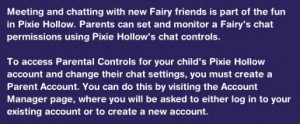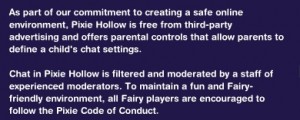 Today I decided to try my hand at something slightly different, or at least different from Second Life, which I have come to abhor, but I’ll stop there so I don’t rant. So today I made an avatar for myself from Pixie Hollow. My name is Hale Rivercloud and I am a sparrow-man. I have an awesome little green suit and fancy-shmancy little wings that I can use to fly around and collect things like spider webs, berries, and flowers for trade. I will admit that I felt somewhat sleazy being in a virtual world for children much younger than myself. It is for this reason that I refrained form taking part in any chatting or “friendly” behaviour.
Today I decided to try my hand at something slightly different, or at least different from Second Life, which I have come to abhor, but I’ll stop there so I don’t rant. So today I made an avatar for myself from Pixie Hollow. My name is Hale Rivercloud and I am a sparrow-man. I have an awesome little green suit and fancy-shmancy little wings that I can use to fly around and collect things like spider webs, berries, and flowers for trade. I will admit that I felt somewhat sleazy being in a virtual world for children much younger than myself. It is for this reason that I refrained form taking part in any chatting or “friendly” behaviour.
Once I had my fill of this fabulous fairy land, I logged out and went in search of privacy and security information for the site and the “virtual space” in which children take part. I ended up coming across parental information. The information provided for parents related to security and chat settings, since this seems to be the main way that children would be “preyed” upon while in Pixie Hollow. As Meyers et al. (2010) write:
The challenge in our current childhood landscape is that any risk is perceived as unacceptable. We appear to live in a risk-averse culture that works not just to reduce unnecessary risk, but also to eliminate the slightest possibility of harm to children (Byron, 2010).
 The information put forth by Disney seems to be sometimes overly protective in nature, bringing attention to their moderators and monitors a number of times. The chat is filtered through moderators at all times within the game, thus hindering the communication in some ways. Perhaps this is for safety of the children, but there are ways to monitor without necessarily interfering in word choice. Maybe I’ll just end up being a horrible parent, but I don’t think that monitoring children to such an extreme is always helpful.
The information put forth by Disney seems to be sometimes overly protective in nature, bringing attention to their moderators and monitors a number of times. The chat is filtered through moderators at all times within the game, thus hindering the communication in some ways. Perhaps this is for safety of the children, but there are ways to monitor without necessarily interfering in word choice. Maybe I’ll just end up being a horrible parent, but I don’t think that monitoring children to such an extreme is always helpful.
But it’s not only safety and security issues involved here. There are suddenly more limitations on children participating in the online environment. They lose control of their own behaviour because of parental and adult interference. I can’t help but feel that this is a bad thing. Perhaps I’m only saying this because I don’t have children or because I haven’t suffered from online issues of bullying or abuse, but I feel that limiting freedom is something that is complex and must be very, very carefully considered.
Meyers et al. also address the issue of what can happen to ideas of freedom when adults attempt to constantly monitor and inform online social behaviour of children and youth.
Efforts to eliminate exposure to risk may limit opportunities for young people to develop essential cognitive and metacognitive strategies (Livingstone, 2009). Donovan and Katz (2009) argue that children are informed social actors and that attempts by adults to monitor their online behavior and filter their websites has a chilling effect on children’s and youth’s privacy and free speech.
This post has been very limited in scope, but it’s my experience and my reactions so I obviously can’t cover everything that I would like from the article in the Journal of Virtual Worlds or in the Livingstone chapter. Perhaps I will make another small post or add some comments at a later time, but this is all for now. Thanks for listening!

3 replies on “Fairies and Freedom”
Rob I was so happy when I first read your post, I wasn’t the only one who entered to a virtual world that is not designed for their age!
To tell the truth I was pretty scared with the idea (I am still) of second life, I don’t know it seems so difficult to manage so I decide to try first in the other virtual worlds for kids.
My first try was with BarbieGirls, a world of Barbies created by Mattel. I tried to interact with the site as a kid: dressing my avatar, having a room and decorating it, and playing but I got disappointed because the interesting games were exclusive to V.I.P. Barbies, they offer me a lots of times to join them but I really don’t want to spend money in it. In general aspect, I got disappointed with the world because I was hoping that would be “new” and have “new” things in a virtual world: like things that you can only do there or really new stuff, but mostly it reproduce model of reality: girls do the same that society tell them to do: buy, dress, play, chat, have a nice room, a nice closet and so on…
Now, in a more serious aspect, the parents and security are considered in the site: when I joined they asked me for the e-mail of my parents and the site send a email where they specified what is the site about, the characteristics and give a link where they can create a “parent’s place account”. In this place parents can surveillance their kids with tools like: “Update your daughter’s account. /Manage your daughter’s chat status. /Get the inside scoop on all the latest features on BarbieGirls.com. /Upgrade to Barbie Girls® V.I.P. / Create your very own B Smart Pact” (http://www.barbiegirls.com/parent_home.jsp).
I think that is a great initiative that they introduce the parents inside the virtual world, but is correct that parent can see everything that their daughters are doing? and chatting? For me is almost when your parents intend to listen to your phone conversations (I haven’t have a cell phone until I was 18 and even there was too expensive to have a “real/expanded” conversations) I know, as Rob, that maybe I’m not so aware of the dangers of Internet as I don’t have any kids by my own, but sometimes the extreme monitoring can damage too. And how many kids put their own e-mail account in the servers? So they don’t have to manage their parents enter in their accounts.
After this experience I decided to join another virtual world: Gaiaonline.com; I’m pretty new: at this moment I have my avatar decent dress (because “the style is so important in gaia”), an aquarium and a house. I will try to interact a little more but I feel really embarrassed.
Anyway, thanks for the attention and have a nice reading week!
Good post Rob, I found myself highlighting those same passages in the articles. I too tend to come down against over-protection of children (online or otherwise) given the option, but I also don’t have any kids of my own. As is pointed out in the Livingstone article, “resilience can only develop through exposure to risk or to stress.” I think that kids should absolutely be educated about the potential dangers of online activity, but by attempting to micromanage their activities and eliminate all risk in their behaviors parents (/companies?) are making it impossible for children to learn how to cope with these challenges on their own. For instance, it seems reasonable to suggest that a child who has spent some time in less ‘controlled’ online environments, and has perhaps experienced some unpleasant and unwarranted harassment by anonymous individuals would be better prepared to deal with a more serious case of ‘cyberbullying’ than one who had only experienced the relatively protected world of Club Penguin, and assumes the online world to be safe. This is not to suggest that kids shouldn’t have safe online spaces like ‘Club Penguin,’ where they can socialize online, but that parents shouldn’t use the site’s safety settings as an excuse for not talking to their kids about potential dangers online. I’ll admit, I was pretty uncomfortable signing into Club Penguin; I felt like I was hiding inside a stuffed animal in a preschool – the whole ‘kid friendly’ site design seemed designed as much to deter me as to appeal to children, but I don’t imagine that would hold true for real online predators, so the ‘safety’ is largely still an illusion, and I don’t believe any amount of monitoring or chat limitations is going to change that.
The other line of thought that I found intriguing in these articles is summed by by Livingstone’s statement that the use of the internet “exacerbates the risks in children’s lives to the extent that a generation comes to rely on it for their social lives.” This emphasis on the extent to which children depend on these types of online communities in constructing their own identities and social lives raises a number of serious questions. The Journal of Virtual Worlds Research article points out the “chilling effect on children’s and youth’s privacy and free speech” that parental monitoring has on these spaces. Taken together, this suggests that children will learn that they are unable to rely on privacy in the communications platforms that they use to build and organize their social lives; while disturbing in that it may inhibit their ability to develop ideas and relationships, this might be an important lesson to learn early on if they can expect to see anything similar to the current online social networks when they are older.
Livingstone’s implication that young generations are coming to rely on virtual worlds for their social lives brought another concern to my mind that I didn’t feel was addressed in either of these papers, and that is the ‘fantasy’ element of many of these virtual worlds. The ability to create an avatar with whatever identity one desires in a virtual world can be wonderfully liberating, but children coming to rely on such ultimately fictitious identities for their social lives strikes me as quite alarming. Having “lived” thousands of hours of my life in one such virtual world, Everquest, this concern is at least partially based on experience (the /played command to show your total played time for an avatar can be pretty sobering). Especially for younger children, it seems that socializing extensively through fictional identities would limit their ability to develop their own ‘real’ identity and living, breathing ‘social network.’ Games and networks like these blur the lines of reality by allowing one to socialize with real people, but through fictional alter egos in fantastical locations. The emotions are real, but the characters and rewards are not. Even Second Life, which is much more closely tied to real life than MMORPGs like EQ, seems to be used primarily as an escape from reality; a space to explore and create new identities. I don’t have any problems with this, per se, but I think the potential for addiction (although I hate to use that word) is serious, and could be as dangerous to a child’s development as the typical parental concerns over predators and bullies. I, for one, am grateful that my parents pulled the plug and sent me off to language camp.
Like Schuyler, I also spent some time in Club Penguin. I actually had a pretty good experience. I felt a bit weird being there, like I was trespassing somewhere I didn’t belong, so I avoided interacting much with the other denizens. I tried looking at the place from a pre-teen perspective, and I can imagine having a lot of fun there as a kid. The games were simplistic but well done, and there seemed to be a lot of places to explore. Like others have said, it’s a very limiting experience of what it means to interact online, and I can see such sites being problematic if they are used as ‘babysitters’, like TV was often used for my generation. Still, in moderation, I think it’s a pretty positive experience.
I’m not to worried about monitoring in these kinds of situations, since most of the interaction is based around games and such, but as kids get older, and want to talk about more ‘important’ issues, then monitoring becomes a more serious issue.
One of the passages from Livingstone that stood out the most to me was this one on how girls interact:
“Teenagers need, and will actively seek out, opportunities to discuss sexuality among their peers, and here the internet offers a valued
opportunity. As Stern (2002) shows, teenage girls use the internet not only to express their identity but also to explore, often in a private, intimate, sometimes anonymous, sometimes confessional manner,
their confusions, vulnerabilities, uncertainties and ignorance regarding sexuality, including sexual norms, emotions and health”
The thing that struck me about this is that current technology makes it literally impossible to do this online while being sure that the people you are talking to are indeed who they say they are (i.e. teen-aged girls). Proving your identity without giving up your privacy to an outside authority is a bit of an intractable problem right now, and one where the “real world” clearly trumps these virtual meeting places.
Any monitored virtual world would rightly shut down talk of sexuality among users, not because teenagers discussing sexuality is wrong (I think it is critical), but because there’s no way of knowing who is listening in.